Donate to Links
Click on Links masthead to clear previous query from search box
Inspired by the unfolding socialist revolution in Venezuela, as well as the continuing example of socialist Cuba, Links International Journal of Socialist Renewal is a journal for "Socialism of the 21st century", and the discussions and debates flowing from that powerful example of socialist renewal.
Links is also proud to be the sister publication of Green Left Weekly, the world's leading red-green newspaper, and we urge readers to visit that site regularly.
Please explore Links and subscribe (click on "Subscribe to Links" or "Follow Links on Twitter" in the left menu). Links welcomes readers' constructive comments (but please read the "Comments policy" above).
This site is best viewed with the Firefox internet browser.
Brian Manning and the Gurindji `walk offs’
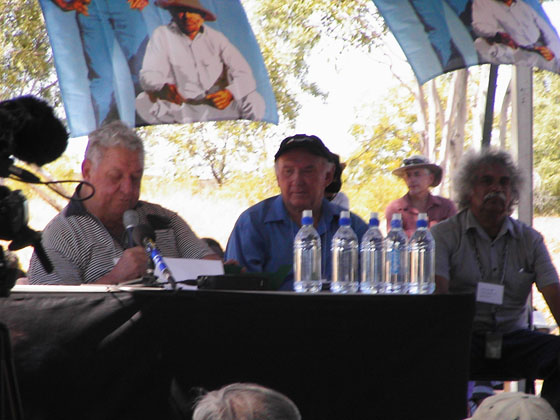
Brian Manning addressed the Gurindji Freedom Day celebration to mark the 45th anniversary of the historic walk-off.
On November 3, 2013, Brian Manning -- veteran Northern Territory communist, trade unionist, campaigner against racism, long-time activist for Indigenous people's rights and solidarity campaigner with the East Timorese people (among many other causes) -- died in Darwin. Brian won enormous respect for his commitment to human rights and his unstinting dedication to changing the system. As a tribute to Brian, Links International Journal of Socialist Renewal highlights one important chapter in his inspiring political life: his important role in the historic struggle of the Gurindji people for their rights.
* * *
By Terry Townsend
[The following is an excerpt from The Aboriginal Struggle & the Left (Sydney: Resistance Books, 2009.]
General Vo Nguyen Giap (1911-2013): Military hero, revolutionary intellectual, environmentalist

General Vo Nguyen Giap, second from left, with Ho Chi Minh, in 1957.
By Michael Karadjis
October 24, 2013 – Links International Journal of Socialist Renewal -- Few people from the 20th century can really claim to have changed history. One of them without a doubt was General Vo Nguyen Giap, who led the Vietnamese people to defeat the French and US empires.
Giap died on October 4, aged 102.
While mainly remembered as a military leader, Giap was also one of Vietnam’s most significant political leaders, a revolutionary intellectual, an environmentalist and a campaigner for progressive change within his own country.
Socialists and the fight against rape culture, misogyny and women's oppression
For more discussion on feminism, click HERE.
October 13, 2013 -- Green Left TV/Links International Journal of Socialist Renewal -- Socialist Alliance and socialist youth group Resistance held a seminar in Sydney on March 14, 2013, on the topic of 21st century feminism. Socialist Alliance's Lisa Macdonald, a Green Left Weekly journalist, and Alison Pennington, a member of the Resistance and Socialist Alliance, spoke about the culture of violence that exists in our society, how women can fight collectively to live in an equal and violence-free society, and why socialists wholeheartedly support these struggles.
‘Growth imperative’ versus ‘climate imperative’

By Tarique Niazi
November 3, 2013 -- Climate and Capitalism -- Attempts to use capitalist markets to reduce greenhouse gas emissions ignore the fact that fossil fuels are the lifeblood of the capitalist economy, and the strongest forces in the market are fossil fuel producers.
In 2007, the United Nations Intergovernmental Panel on Climate Change (IPCC) turned in its fourth assessment of global climate change, a work that was recognised with a Nobel prize. In this assessment, the IPCC concluded with 90% certitude that the rising concentration of carbon in the atmosphere was human induced. This revelation jolted the world out of slumber to see its infinite footprint on a finite planet. The Nobel Committee in Stockholm echoed this awakening — of dangers ahead — with an award that befitted the work of the IPCC and its fellow honoree US vice-president Al Gore. Six years after, the same IPCC at the same UN spoke with ever higher certitude (of 95%) that carbon emissions are credibly sourced to humans. Yet the world just yawned and went about its business.
Luxembourg: Election opens new political chapter

Symbol of the anti-capitalist party déi Lénk.
Click HERE for articles by Murray Smith. For more on Luxembourg click HERE. For more on Europe, click HERE.
By Murray Smith
November 1, 2013 – Links International Journal of Socialist Renewal -- Legislative elections were held in Luxembourg on October 20. The immediate outcome was that the ruling (practically non-stop since 1945) Christian Social People’s Party (CSV) looks headed for the opposition benches. A new three-party government is in the making, under the aegis of the Democratic Party, the most thoroughgoing liberal party in Luxembourg and the big winner in these elections, obviously taking votes from the CSV.
The anti-capitalist party déi Lénk (the Left) made less spectacular but solid progress.
'Left reformism' and socialist strategy

Syriza supporters march. "Left reformists"?
By Ed Rooksby
October 7, 2013 -- International Socialism -- There has been a significant revival of interest among the radical left in “big picture” questions of socialist strategy that, as Mark L. Thomas has pointed out, represents a return to “important debates of the left largely absent over the last three decades”.1
It is not difficult to identify the major factors driving this. Several years of deep capitalist crisis together with the almost total capitulation of social-democratic parties across Europe to the austerity agenda have opened up a clear space to the left of these organisations—a development that has reinvigorated the radical left, but which has also forced it to confront fundamental questions of strategic orientation.
In defence of Murray Bookchin

Recovering Bookchin: Social ecology and the crises of our time
By Andy Price
New Compass Press: 2012
Reviewed by Ian Angus
October 30, 2013 -- Climate and Capitalism, posted at Links International Journal of Socialist Renewal with permission -- In June 1987, long-time anarchist and environmental activist Murray Bookchin was keynote speaker at the first national meeting of US Greens in Amherst, Massachusetts. Before his talk, Bookchin placed a copy of a long article he had just written on every seat. In the article and in his talk – both titled “Social Ecology versus Deep Ecology: A Challenge for the Ecology Movement” – Bookchin described “two conflicting tendencies” in the environmental movement.
On one side, “deeply concerned naturalists, communitarians, social radicals and feminists” were challenging the “hierarchical, sexist, class-ruled” society responsible for environmental destruction, and developing a “coherent, and socially oriented body of ideas that can best be called social ecology”.
Czech Republic: Elections likely to intensify crisis
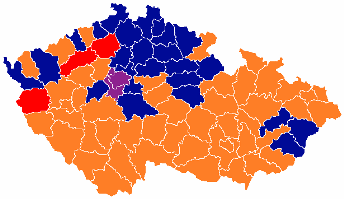
Parties elected -- Red: Communist; Orange: ČSSD; Blue: ANO 2011; Purple: TOP 09.
By Jirí Málek
October 29, 2013 -- Transform! -- After a government crisis in summer, early elections were called in the Czech Republic. October 25-26 were the D days. The campaign was relatively short and the program documents were of little interest to the majority.
The campaign was more about persons and political marketing. Polls were showing positive results for the left, but the last two weeks revealed that the situation would be much more complicated and without a clear majority of the left.
Results
Parties elected to parliament:
CSSD (Social democrats): 20.5%, 50 seats (down six)
ANO 2011 (a new political formation): 18.7%, 47 seats
KSCM (Communist Party of Bohemia and Moravia): 14.9%, 33 seats (up seven)
TOP 09 (until now the ruling right-wing party): 12.0%, 26 seats (down 15)
ODS (until now a dominant right-wing, ruling party): 7.7%, 16 seats (down 37)
USVIT (a new political formation): 6.9%, 14 seats
KDU-CSL (Christian democrats): 6.8%, 14 seats
In memory of Doug Lorimer

The photo above (Sydney, c 1975) shows (from right): Joy Ecclestone, Dave Holmes, Doug Lorimer, (unknown), Geoff Payne.
[For more by or about Doug Lorimer, click HERE.]
By Dave Holmes
[These brief remarks were delivered at a memorial meeting for Doug Lorimer in Melbourne on October 25, 2013, organised by Socialist Alternative.]
October 25, 2013 -- Links International Journal of Socialist Renewal/Arguing for Socialism -- The July 27, 2013, Green Left Weekly carried an obituary for Doug Lorimer written by Pat Brewer. For comrades interested in the basic details of Doug's political CV I would recommend it.
I first met Doug in February 1971 in Adelaide. John Percy, myself and Dave Riley went over as a national investigating commission of the Socialist Youth Alliance (SYA). Two members of the local SYA branch were or had become Maoists and were causing us some political embarrassment. Doug Jordan was the branch organiser.
Belgium: Eight questions on trade union independence and politics

Document of the General Federation of Belgian Labour (Fédération Générale du Travail de Belgique/Algemeen Belgisch Vakverbond, FGTB/ABVV) in Charleroi and Sud-Hainaut, Belgium
[For background, see "Belgium: Class trade unionism seeks political expression".]
October 22, 2013 -- International Viewpoint -- The Charleroi and Sud-Hainaut regional organisation is the second biggest of the FGTB in membership terms (102,000). It has just printed 10,000 copies of a pamphlet whose key passages are reproduced below.
1. Can trade unions get involved in politics?
Global wealth inequality: top 1% own 41%; top 10% own 86%; bottom half own just 1%

By Michael Roberts
October 10, 2013 -- Michael Roberts' Blog -- Just 8.4% of all the 5 billion adults in the world own 83.4% of all household wealth (that’s property and financial assets, like stocks, shares and cash in the bank). About 393 million people have net worth (that’s wealth after all debt is accounted for) of over $100,000, that’s 10% own 86% of all household wealth!
But $100,000 may not seem that much, if you own a house in any G7 country without any mortgage. So many millions in the UK or the US are in the top 10% of global wealth holders. This shows just how little two-thirds of adults in the world have – under $10,000 of net wealth each and billions have nothing at all.
This is not annual income but just wealth – in other words, 3.2 billion adults own virtually nothing at all. At the other end of the spectrum, just 32 million people own $98 trillion in wealth or 41% of all household wealth or more than $1 million each. And just 98,700 people with "ultra-high net worth" have more than $50 million each and of these 33,900 are worth over $100 million each. Half of these super-rich live in the US.
`Foro Social Latinamericano', October 2013 issue: Green Left Weekly's Spanish-language supplement

[Haga clic aquí para más artículos en español.]
October 27, 2013 -- Links International Journal of Socialist Renewal -- Providing facts and analysis, and publicising and organising Latin America solidarity activities in Australia, Green Left Weekly and Links International Journal of Socialist Renewal has sought to promote greater understanding and solidarity between the people of Australia and Latin America.
We are therefore delighted to publish Latin America Social Forum (Foro Social Latinamericano), a Spanish-language supplement produced regularly by the Latin America Social Forum in Sydney.
We hope the supplement will help build stronger links and solidarity between the Spanish-speaking communities in Australia and all those involved in the urgent struggles for the people and the planet. In the words of Venezuela’s late president Hugo Chavez: “Time is short. If we don’t change the world now, there may be no 22nd century.”
South Africa: 'Beacon of hope' still flickers faintly
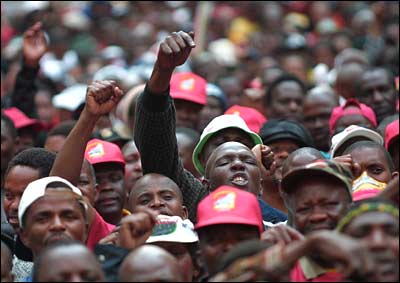
By Terry Bell
October 25, 2013 -- Terry Bell Writes, posted at Links International Journal of Socialist Renewal with permission -- “South Africa has rather fallen off the radar”, the BBC journalist noted. This was similar to comments voiced by former anti-apartheid activists and by several one-time strugglista exiles, mainly in London, who never returned home to settle. Because, in the mainstream media of Europe, there is little mention of South Africa; and, after six weeks abroad, it was for me a useful reminder of how minor is our role in global political and economic affairs.
And the moral high ground bequeathed to the country and its post-apartheid government by the global struggle against apartheid has also all but evaporated, depositing a residue of concern and disillusionment among many of those who once saw South Africa as a global beacon of hope. “What on Earth is happening there?” was a common, and concerned query, expressed by those who seek out what news they can of the country.
South Africa: 'Political power without economic power is like an empty tin' -- NUMSA leader Irvin Jim
It is obvious that the black capitalist class favours capitalism and that it will do its best to influence the post-apartheid society in this direction.
It is obvious that the black middle and upper classes who take part in a broad liberation alliance will jostle for hegemony and attempt to represent their interests as the interests of all Africans.
It is obvious that (like their counterparts in every part of the world) the black middle and upper strata, who find themselves on the side of the people’s struggle, are often inconsistent and vacillating. They are usually the enemy’s softest targets for achieving a reformist, rather than a revolutionary, outcome.
-- Joe Slovo, The South African Working Class and the National Democratic Revolution, 1988.
Irvin Jim, general secretary, National Union of Metalworkers South Africa (NUMSA), presented the 2013 Joe Slovo Memorial Lecture, on October 20, 2013
Comrade chairperson,
¿Por qué el gobierno 'Roji-Verde' de Noruega ha sido derrotado por la coalición de derechas?

Escaños obtenidos: SV – Partido de Izquierda Socialista; A – Partido Laborista; MDG – Partido
de los Verdes; FRP – Partido del Progreso; H – Partido Conservador; V – Partido Liberal; KRF
– Demócratas Cristianos; SP – Partido del Centro. Fuente: http://www.valgresultat.no/bs7g.html.
[English at http://links.org.au/node/3527.]
Por Asbjørn Wahl and Roy Pedersen
September 20, 2013 -- Transform!, translated by http://www.sinpermiso.info/ -- El gobierno de coalición Roji-Verde de Noruega, cuya plataforma política fue calificada, cuando asumió el poder en el 2005, como la más progresista de Europa, ha sufrido una amarga derrota en las elecciones parlamentarias del 9 de septiembre. Una coalición de partidos de centro- derecha y derecha, en la que se incluye un partido populista, ha obtenido una sólida mayoría y está actualmente gestionando la plataforma política del nuevo gobierno.
Love and revolution

Many will call me an adventurer – and that I am, only one of a different sort – one of those who risks his skin to prove his truths...I have loved you very much, only I haven’t known how to express my affection. I am extremely rigid in my actions, and I think that sometimes you didn’t understand me. It hasn’t been easy to understand me. Nevertheless, please take me at my word today…An abrazo (hug) from your obstinate and prodigal son. -- Che Guevara, March 31,1965
By John Rainford
Belgium: Class trade unionism seeks political expression

Daniel Piron, the Charleroi regional secretary of the FGTB.
By Daniel Tanuro
October 17, 2013 -- International Viewpoint -- In the social and political history of Belgium, May 1, 2012, could mark a milestone. On that day the leaders of the Charleroi regional branch of the socialist trade union General Federation of Belgian Labour (Fédération Générale du Travail de Belgique/Algemeen Belgisch Vakverbond, FGTB/ABVV) — the second biggest in the country, with 102,000 members — publicly broke with the social-democratic party and called for a rallying of the left to the perspective of a new broad, anti-capitalist force to the left of the Parti Socialiste (PS) and the Greens. An unprecedented thunderbolt… and not without consequences.
May Day speeches in Belgium are generally unsurprising but like all rules, this has its exceptions. On May 1, 2012, in Charleroi, a big stone was thrown in the water by Daniel Piron, the regional secretary of the FGTB. Before stunned and furious social-democratic leaders, and in the presence of several hundred enthusiastic trade unionists, Piron denounced the austerity policies with which the PS has collaborated for 25 years without a break.
Western Australia: Socialist councillor re-elected in Fremantle
For more on socialists in municipal councils, click HERE.
By Alex Bainbridge
October 20, 2013 -- Green Left Weekly -- Socialist Alliance Western Australia's co-convenor Sam Wainwright was re-elected to the Fremantle municipal council on October 19. In the other wards, progressive councillors defeated conservative opponents, and Greens Mayor Brad Pettitt was also returned.
Wainwright won 58% of the vote in his ward compared to 33% at the 2009 poll. Wainwright's absolute vote also increased from 438 votes to 602 this year.
Over the last four years Wainwright has made a priority of organising and promoting community campaigns and supporting council initiatives such as a dramatic increase in the cycling budget. He has been a strong supporter of the Fremantle Road to Rail campaign and helped promote a community-owned wind farm at North Quay.
He introduced the Workplace Values policy which recognises the right of council employees to trade union representation and job security, and set a target for the employment of Indigenous people.
Wainwright has vigorously defended the Warrawee Women's Refuge which battles to maintain funding levels, and introduced policy to include and respect people with disabilities.
On Marxism and melodrama: An interview with Lars Lih
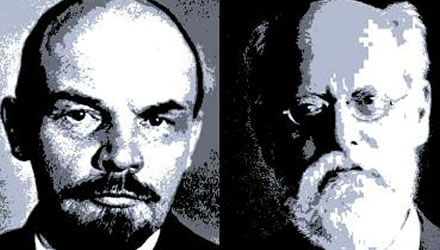
Lars Lih has explored the political and theoretical relationships between Lenin and Karl Kautsky.
[Click HERE for more by or about Lars Lih. For more discussion on Lenin, click HERE.]
Lars Lih interviewed by Dario Cankovic
October 2, 2013 -- The North Star, submitted to Links International Journal of Socialist Renewal by Dario Cankovic -- Lars T. Lih lives and works in Montreal, Quebec. He is an adjunct professor of musicology at the Schulich School of Music, McGill University and writes about Russian and socialist history on his own time. His books include Bread and Authority in Russia, 1914-1921 (1990), Lenin Rediscovered: What Is to Be Done in Context (2006) and Lenin (2011), a biography. Links to his articles online can be found here.
The talented and reviled Mr Pepper (Comintern agent)

A Communist Odyssey: The Life of József Pogány/John Pepper
By Thomas Sakmyster
Budapest-New York: Central European University Press, 2012
Photos, bibliography, index; 249 pp.
Reviewed by Dan La Botz
October 2013 -- New Politics, posted at Links International Journal of Socialist Renewal with the author's permission -- During normal times in a capitalist society, skill and drive are harnessed by the corporations, the labour union bureaucracy and the political parties, but when the crisis comes a revolutionary party must harness the most talented and most ambitious for its purposes. The idealistic and the opportunistic, the selfless and the self-aggrandising, the ruthless and the kind, the brave and the cowardly among those most determined and striving souls must somehow be made use of for the higher purposes of the revolution and ultimately for of all of humanity. The revolutionary movement must bring out the best in them, for we are the only material we have.








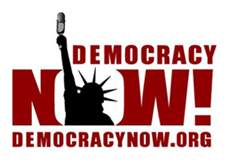



Recent comments
1 day 2 hours ago
5 days 19 hours ago
6 days 23 hours ago
1 week 1 hour ago
1 week 1 day ago
1 week 3 days ago
1 week 5 days ago
2 weeks 13 hours ago
2 weeks 2 days ago
2 weeks 2 days ago